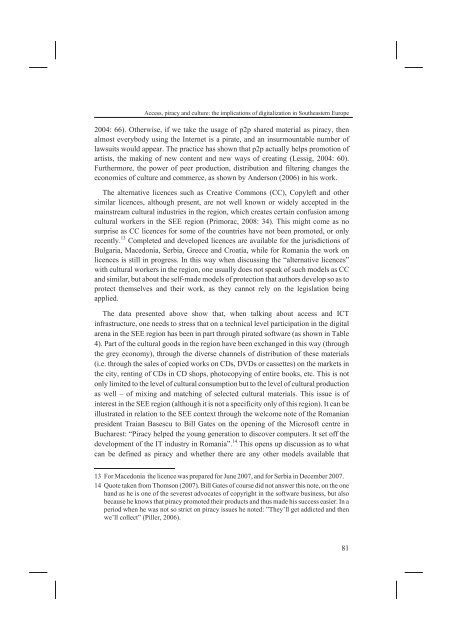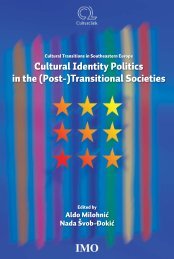D:\Documents and Settings\Ana\My Documents\Biserka-knjiga ...
D:\Documents and Settings\Ana\My Documents\Biserka-knjiga ...
D:\Documents and Settings\Ana\My Documents\Biserka-knjiga ...
Create successful ePaper yourself
Turn your PDF publications into a flip-book with our unique Google optimized e-Paper software.
Access, piracy <strong>and</strong> culture: the implications of digitalization in Southeastern Europe<br />
2004: 66). Otherwise, if we take the usage of p2p shared material as piracy, then<br />
almost everybody using the Internet is a pirate, <strong>and</strong> an insurmountable number of<br />
lawsuits would appear. The practice has shown that p2p actually helps promotion of<br />
artists, the making of new content <strong>and</strong> new ways of creating (Lessig, 2004: 60).<br />
Furthermore, the power of peer production, distribution <strong>and</strong> filtering changes the<br />
economics of culture <strong>and</strong> commerce, as shown by Anderson (2006) in his work.<br />
The alternative licences such as Creative Commons (CC), Copyleft <strong>and</strong> other<br />
similar licences, although present, are not well known or widely accepted in the<br />
mainstream cultural industries in the region, which creates certain confusion among<br />
cultural workers in the SEE region (Primorac, 2008: 34). This might come as no<br />
surprise as CC licences for some of the countries have not been promoted, or only<br />
recently. 13 Completed <strong>and</strong> developed licences are available for the jurisdictions of<br />
Bulgaria, Macedonia, Serbia, Greece <strong>and</strong> Croatia, while for Romania the work on<br />
licences is still in progress. In this way when discussing the “alternative licences”<br />
with cultural workers in the region, one usually does not speak of such models as CC<br />
<strong>and</strong> similar, but about the self-made models of protection that authors develop so as to<br />
protect themselves <strong>and</strong> their work, as they cannot rely on the legislation being<br />
applied.<br />
The data presented above show that, when talking about access <strong>and</strong> ICT<br />
infrastructure, one needs to stress that on a technical level participation in the digital<br />
arena in the SEE region has been in part through pirated software (as shown in Table<br />
4). Part of the cultural goods in the region have been exchanged in this way (through<br />
the grey economy), through the diverse channels of distribution of these materials<br />
(i.e. through the sales of copied works on CDs, DVDs or cassettes) on the markets in<br />
the city, renting of CDs in CD shops, photocopying of entire books, etc. This is not<br />
only limited to the level of cultural consumption but to the level of cultural production<br />
as well – of mixing <strong>and</strong> matching of selected cultural materials. This issue is of<br />
interest in the SEE region (although it is not a specificity only of this region). It can be<br />
illustrated in relation to the SEE context through the welcome note of the Romanian<br />
president Traian Basescu to Bill Gates on the opening of the Microsoft centre in<br />
Bucharest: “Piracy helped the young generation to discover computers. It set off the<br />
development of the IT industry in Romania”. 14 This opens up discussion as to what<br />
can be defined as piracy <strong>and</strong> whether there are any other models available that<br />
13 For Macedonia the licence was prepared for June 2007, <strong>and</strong> for Serbia in December 2007.<br />
14 Quote taken from Thomson (2007). Bill Gates of course did not answer this note, on the one<br />
h<strong>and</strong> as he is one of the severest advocates of copyright in the software business, but also<br />
because he knows that piracy promoted their products <strong>and</strong> thus made his success easier. In a<br />
period when he was not so strict on piracy issues he noted: ”They’ll get addicted <strong>and</strong> then<br />
we’ll collect” (Piller, 2006).<br />
81



